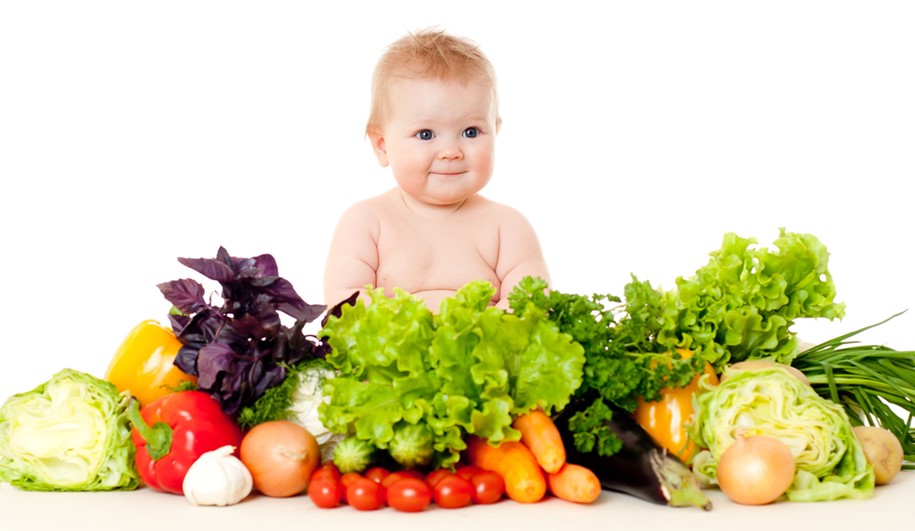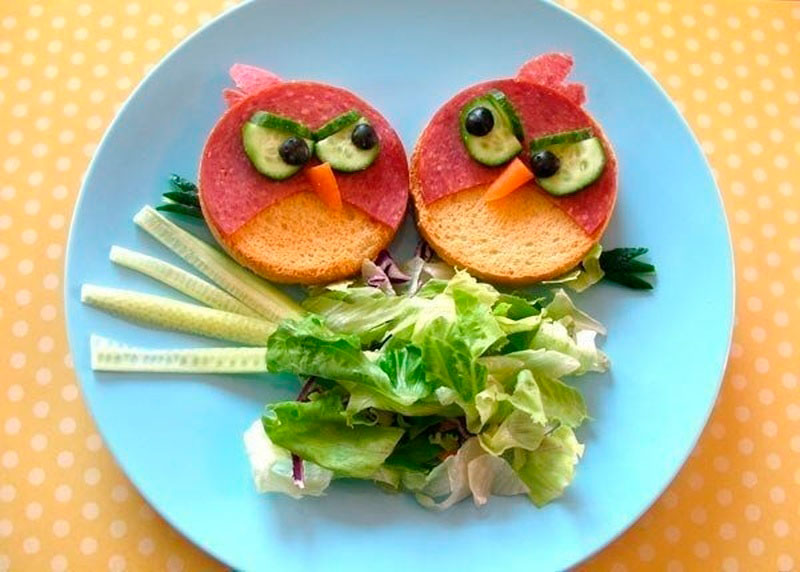Is your child too picky about food or does it seem like he eats little? Then you may find our tips useful.

During the first two years of their life, kids learn to sit, stand, walk, talk, and they also try solid food. According to nutritionists, it is very important to start eating food on time, in the right amount, consisting of really useful products for the body. This skill can and should be trained, since eating habits that are formed in early childhood continue to affect tastes throughout life.
1. Be patient
When the baby took his first step, you did not expect him to run a hundred meters soon. Be guided by the same principle and at the organization of its food. Do not hope that the baby will readily eat wholesome food as soon as it tastes it for the first time. According to nutritionists, a child will fall in love with a vegetable or fruit only after trying it 10 times. So do not rush to call the child "little one."
2. Introduce variety
Offer your baby as many different products and tastes as age standards allow, your imagination and financial capabilities. If you decide to feed him rice, cook first round, then - “jasmine”, another day later - brown.
Experiment with the original serving of dishes: put the vegetables on a plate in the form of a rainbow, draw cream stars on broccoli mashed soup, make a caterpillar of chicken fillet or an owl of hedgehogs with mashed potatoes. At 2 years old, the “appetite crisis” sets in when they begin to abandon their previously beloved dishes, but with such a variety, its menu will not be completely meager.

There are children who refuse to eat anything other than cheese or noodles of a certain kind. At the same time, they also require that the cheese be sliced exactly as they like, and all other food is disgusting, up to vomiting. Nutritionists explain that this is not an ordinary whim, as parents might think. This happens if, by the age of 2, the child has not been introduced to different forms, consistencies, tastes, and aromas of food. So you have to catch up, only it will take more effort.
“I have met children who do not eat anything other than a certain type of cheese and pasta,” says nutritionist Marina Vlasova. - Moreover, the cheese must be cut in a certain way. All other foods disgust up to vomiting. Unfortunately, this is not just a whim, as many parents think. This is the result of the fact that by the age of two the child did not get acquainted with dishes of different consistency, form, taste and smell. Now you have to start all over again, but with great effort. "
3.Experiment with textures
Nutrition experts advise giving children dishes of different consistencies. This can be one product that changes the structure depending on the method of preparation and serving (whole banana, banana puree, slices of banana) or different (bread, cereals, meat, vegetables, fruits). Practice shows that in children who were fed not only mashed potatoes, but also in a different form at the age of 6–9 months, there are fewer nutrition problems than those who were offered only food from a blender.
4. Allow the child to behave freely at the table
When the baby runs his finger in a plate with mashed potatoes or spreads porridge on the table, he does not indulge, but examines the food and gets to know it by touch. It is as important as tasting it and tasting it.
5. Ignore the grimaces
Do not pay attention to the expression on the face with which the child is trying a new dish. Even if he wrinkles his nose, taking a piece of zucchini in his mouth, do not rush to conclude that the peanut is disgusting or he will never eat it again. According to experts, grimacing while eating is absolutely normal. Often the kids frown, but at the same time continue to eat with appetite.

When older children say that they don’t like any food, sometimes this means that the dish is simply unfamiliar to them. Say nothing - just put away the plate and offer similar food again in a week.
6. Teach your child to taste food
Acquiring a new taste means putting food on the tongue. Explain to the baby that it is not necessary to chew and swallow it. When you shift the focus from eating to tasting, allowing you to spit out food you don't like, you’ll be more likely to arouse your child’s appetite.
In addition, the baby perceives small portions of 1-2 tablespoons with more enthusiasm than a huge plate filled to the brim.
7. Do not force to eat up
The norms of the amount of food for children of each age are individual. They are influenced by various factors, including physique, body weight, physical and mental activity, and metabolic rate. If you force the child to eat another spoon when he no longer wants, you only form his negative attitude to food. Over time, this will lead to the development of a conditioned reflex, and, sitting down at the table, the child will experience stress every time. Appetite does not appear so sure.
Psychologists claim that in most cases what mothers mistake for eating disorders is not such: it simply either seems to the mother that the child is eating too little, or she has not established a diet.
The following story clearly demonstrates what persuasion to eat another spoon for mom and still for dad can lead to.
One psychologist said that a boy of about 4 years old was brought to him for an appointment. The reason was not related to nutrition, but the specialist noticed how his little client was chewing an apple in anticipation of a consultation - purely mechanically, without emotion. Later it turned out that parents and grandmother with their persuasion and blackmail like “eat the soup, otherwise the bunny will drown” (and at the bottom of the plate a hare was drawn) have achieved a complete lack of understanding of the feeling of satiety, hunger, perception of taste. The boy learned to take food in any form and volume when his mother or grandmother decide that it is time to eat. This food violence soon resulted in a nervous breakdown, which had to be treated by a psychologist.
We also read:You won’t be forcibly fed: why you can’t force a child to eat through force
8. Do not order dishes from the children's menu in restaurants
Contrary to expectations, in the children's menu in restaurants you can often find not the most wholesome dishes. Therefore, it is better to order a small plate of something useful from the adult menu and share food with the child. This will allow the baby to feel like an adult - it is quite possible, he will even eat the whole portion.
9. Set an example
Of course, the child will not gobble up spinach for both cheeks, watching with what pleasure his parents eat hamburgers. Your personal example is the most effective way to convince a child to still taste the taste of a dish that he did not like for the first time.
How to persuade a child to eat vegetables: 7 tips:To “hide” vegetables in dishes that the child loves, to serve beautifully, to feed them to cartoons - whatever parents can think of so that the baby eats a carrot. We tell you how to help your child love vegetables.









If a baby is taught from a certain quality of food almost from birth, then there will be no problems in the future. My daughter is 6 years old and she loves vegetables and various cereals, there are always sweets at home, too, but she is not accustomed to them from birth and therefore eats them very little. It all depends on the parents, to make children healthy or gradually kill them with junk food, from which children suffer from diabetes, grow fat, etc.
Much depends on the food culture in the family. Working in kindergarten, I observe the following situation, if vegetables, meat, fish, fruits, cottage cheese are eaten in the family, then these children enjoy this food with pleasure in the garden, and these are units. And of course, most ask for supplements if they give sausages. A modern society with a fast rhythm, fast cooking, write and the corresponding younger generation.
I have three children. From personal experience, she concluded that the sooner a baby is fed, the less capricious it is for a new dish. The eldest daughter was breastfeeding for only two months, she introduced lure early, so she still eats everything without whims. But the youngest son was breastfeeding until he was two years old, we were in no hurry with lure, and he grew out of it, also a whim at the table. I think that it is necessary to more persistently offer a new taste and wait when the child is hungry as it should. As they say, hungry and be sure to swallow =)!